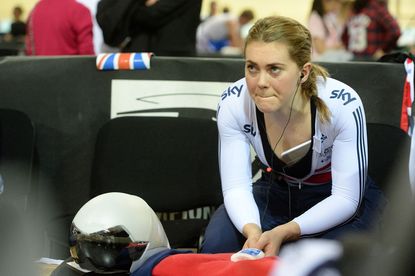Former track sprinter Jess Varnish loses employment tribunal against British Cycling
Jess Varnish has lost her case against British Cycling and UK Sport that tried to prove that she was an employee and could thus sue them both

Jess Varnish (Photo: Andy Jones)

Former track sprinter Jess Varnish has lost her landmark employment tribunal against British Cycling and UK Sport, which she had hoped would prove she was an employee of the bodies and could thus sue them for wrongful dismissal and sexual discrimination.
The ruling means that the 28-year-old is unlikely to be able to take both bodies back into the courtroom and prove her claims that: British Cycling had “extreme control” over her and other athletes; that she was discriminated against by former coach Shane Sutton; and that she suffered detriment for being a whistleblower against the national federation.
She was dropped by the Great Britain squad before the Rio Olympics in 2016 with coaches reasoning that it was a performance-based decision. However, her subsequent high-profile claims, including that there was a culture of fear at the Manchester-based organisation, has since caused change at its headquarters.
At a tribunal in Manchester in December, both BC and UK Sport claimed that national lottery funding awarded to Olympic athletes - which can be as much as £28,000 tax-free per annum - was similar to a university grant and therefore its athletes were not afforded the same employment rights.
This view was backed by Judge Ross on Wednesday evening. UK Sport said it gave it “confidence that the structure of the relationship between other national governing bodies, their athletes and UK Sport can continue in a similar way, but we will reflect on the concerns that were raised through this case.”
>>> Email sent from testosterone supplier to Dr Richard Freeman obtained by BBC
A spokesperson for Varnish said: “Jess and her legal team continue to digest the 43-page judgement and will look to offer a statement to media on Thursday.
Get The Leadout Newsletter
The latest race content, interviews, features, reviews and expert buying guides, direct to your inbox!
Varnish claimed that Sutton had told her “to go and have a baby”. An investigation by UK Sport analysing bullying claims at BC cleared the Australian of that comment, but did find him guilty of using sexist rhetoric against Varnish.
BC reiterated that it would welcome Varnish back to its Manchester base. She won nine medals across World and European Championships and the Commonwealth Games from 2010 to 2014. She also rode the 2012 London Olympics team discipline alongside Victoria Pendleton. The duo broke the world record in the qualifying stages but were relegated in the semi-finals.
In a statement, BC said: “The decision to contest this case was founded on what we believe is the best interests of riders who represent Great Britain, and our conviction that our relationship with them is not one of employer-employee but that of a service provider supporting talented and dedicated athletes to achieve their best.
“We very much regret that Jess was advised to pursue the route of an employment tribunal when we had made significant efforts to reach a resolution which all parties regarded as equitable.”
What does the ruling mean?
Varnish had tried to prove that she was an employee of BC and UK Sport, alleging emails from coaches saying that if riders “don’t sign this, you won’t get paid this month.” She also claimed that aged 15 coaches listened through bedroom doors in hotels on training camps.
Dr Richard Freeman, a former doctor, provided a written statement to the tribunal saying: "The coach would decide everything. The athletes were very firmly controlled. Non-compliance was not acceptable."
Liam Phillips, a former BMX rider for Great Britain, and her agent James Harper also backed her. But the tribunal didn’t agree with her assertions, which will be a huge relief for UK Sport.
BC and UK Sport both insist that changes have been made in relation to athlete welfare, largely due to the concerns expressed by Varnish and others. Had Varnish’s claim that she was an employee been backed, around 1,100 elite athletes who are funded by UK Sport would have been entitled to employment rights and a pension.
Such a huge outlay of money would have meant less athletes would have been funded towards Olympics success, which would have affected the number of riders who call the National Cycling Centre in Manchester their home.
Lawyer Joe McMorrow of Pinsent Masons, who advised UK Sport, said: “This case marks a crucial moment for athletes and the entire sports industry safeguarding funding for athletes for the future. If the tribunal had ruled in favour of the claimant, funding for more than 1,000 could have been called into question.”

Thank you for reading 20 articles this month* Join now for unlimited access
Enjoy your first month for just £1 / $1 / €1
*Read 5 free articles per month without a subscription

Join now for unlimited access
Try first month for just £1 / $1 / €1
A freelance sports journalist and podcaster, you'll mostly find Chris's byline attached to news scoops, profile interviews and feature writing across a variety of different publications. He has been writing regularly for Cycling Weekly since 2013.
Previously a ski, hiking and cycling guide in a number of places, but mostly in the Canadian Rockies and Spanish Pyrenees, he almost certainly holds the record for the most number of interviews conducted from snowy mountains.
He lives in Valencia, Spain.
-
 Overachiever: Cameron Wurf competed in the Amstel Gold, La Flèche Wallonne and an Ironman, all in just eight days
Overachiever: Cameron Wurf competed in the Amstel Gold, La Flèche Wallonne and an Ironman, all in just eight daysCameron Wurf is both a member of Team Ineos Grenadiers and an accomplished professional long course triathlete who has racked up numerous World Tour and Ironman race finishes across his career.
By Kristin Jenny Published
-
 The tech nerd's guide to the perfect coffee
The tech nerd's guide to the perfect coffeeJoe on Joe. What does it take to make a fine mug of Joe? We sent Joe Baker to find out.
By Joe Baker Published
-
 Laura Kenny, Britain’s most successful female Olympian, announces retirement
Laura Kenny, Britain’s most successful female Olympian, announces retirementKenny won five Olympic and seven world titles during her illustrious career on the track
By Tom Thewlis Published
-
 Former Ineos Grenadiers boss Rod Ellingworth becomes race director of Tour of Britain
Former Ineos Grenadiers boss Rod Ellingworth becomes race director of Tour of Britain"I feel a real responsibility to get this right," says Ellingworth about new role
By Tom Davidson Published
-
 'We'll have rounder wheels than everyone else' - Team GB confident in new Olympics tech
'We'll have rounder wheels than everyone else' - Team GB confident in new Olympics techUpdated Hope-Lotus bike won't feature until Paris, confirms performance director Stephen Park
By Tom Davidson Published
-
 Jody Cundy Q&A: 'Strictly Come Dancing made me a stronger cyclist'
Jody Cundy Q&A: 'Strictly Come Dancing made me a stronger cyclist'The Paralympic legend tells Cycling Weekly about almost retiring in 2012, the time he borrowed a Porsche, and how dancing can make us all better cyclists
By Tom Davidson Published
-
 ‘It’s a performance thing’ - why riders are eating Calippos and Greggs steak bakes to fuel gold medals
‘It’s a performance thing’ - why riders are eating Calippos and Greggs steak bakes to fuel gold medalsForget expensive gels, the best race nutrition comes from corner shops
By Tom Davidson Published
-
 Emily Bridges says British Cycling 'violated' her human rights over trans participation rule change
Emily Bridges says British Cycling 'violated' her human rights over trans participation rule changeNational federation blocked transgender riders from competing in its female event category last year
By Tom Thewlis Published
-
 Local authority collaboration key to reinvigorating domestic racing, British Cycling task force says
Local authority collaboration key to reinvigorating domestic racing, British Cycling task force saysEd Clancy, task force chair, says 16 recommendations are ‘realistic and attainable’
By Tom Thewlis Published
-
 Extinction Rebellion protest Shell deal at British Cycling AGM
Extinction Rebellion protest Shell deal at British Cycling AGMGroup promises more action against governing body’s controversial Shell sponsorship
By Tom Davidson Published